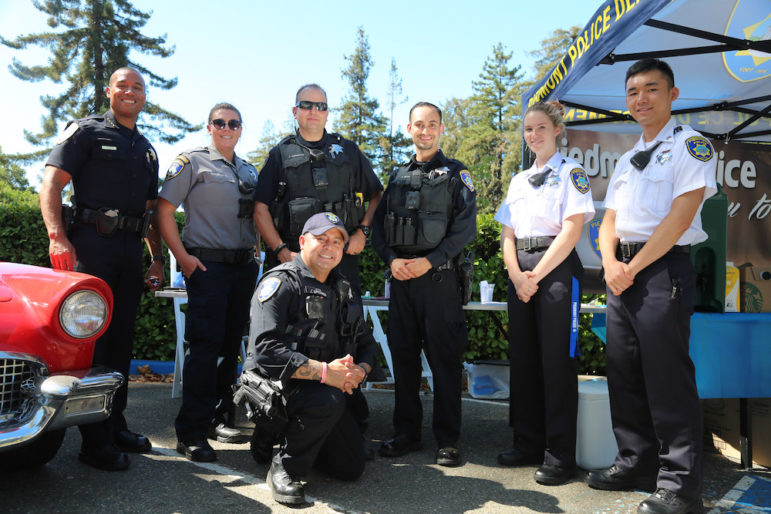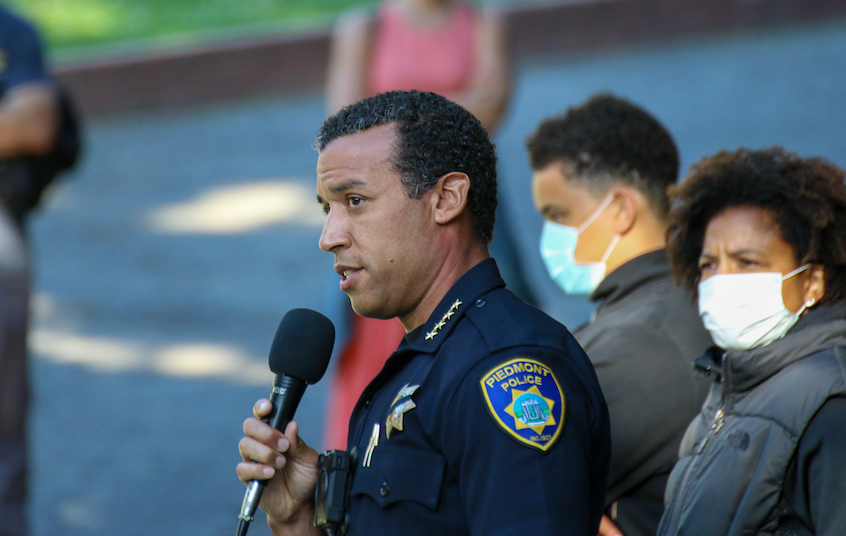Police Chief Jeremy Bowers on Monday night called the May 25 death of George Floyd at the hands of a Minneapolis police officer “the latest example of a historical pattern of the misuse of force and larger issues of inequity in our country.”
In Piedmont, the examination of how the police department does its job fairly and justly, and works to overcome those historical inequities, has been ongoing, Bowers told the City Council Monday night. But he said Floyd’s death and the resulting national outcry is a “first step” in evaluating how his officers strive to do their jobs, and work toward a more effective, and fair, department, especially in terms of use-of-force situations and situations in which racial or cultural bias could affect an officer’s response.
The Piedmont Police Department averages approximately 13,000 calls for service every year (about 35 calls per day). Since 2015, the Piedmont department has averaged four use-of-force incidents a year; one use-of-force event has occurred thus far in 2020, Bowers said. All use-of-force events since 2015, Bowers said, have been found to be within Piedmont department policy.
“We are trying to minimize the use of force, and I think the data bears that out,” Bowers told the council.
Piedmont PD policy prohibits the “choke hold” or any other technique intended to hamper breathing. Also, use of the “carotid control hold,” in which an officer wraps an arm around a suspect’s neck to subdue him or her by cutting off blood to the brain, was suspended effective June 8, and will remain so indefinitely, Bowers said.

As have many police departments, Piedmont’s has increasingly incorporated de-escalation training for use in everyday policing, Bowers said. California Assembly Bill 392, signed by Gov. Gavin Newsom in August 2019, redefines the circumstances under which lethal force by a peace officer is considered justifiable. This law encourages law enforcement to increasingly rely on alternative methods such as less-lethal force or de-escalation techniques.
Bowers said his department is in the process of changing its policy for investigation of officer-involved shootings or in-custody deaths.
Police departments typically do their own internal investigations, he said, parallel to a District Attorney’s investigation of any officer-involved shooting. But the smaller a police department is, he said, the more problematic it can be for officers to investigate their own fellow officers with whom they often work side by side. And the “optics” of such investigations often aren’t good. Formal discussions started in May for the Alameda County Sheriff’s Office to do any such investigation involving Piedmont officers, Bowers said, should that ever arise.
Piedmont police officers, as are all others in California, are legally required to receive training in racial and cultural diversity training and racial profiling training every five years. On top of that, Bowers said, Piedmont officers received procedural justice training in 2014, and implicit bias training in 2017, and his department is actively researching racial, cultural and diversity training to be delivered in 2020 or 2021.
Such training is important now and will continue to be, Bowers told the council, even in a time when officers are increasingly sensitive to racial and cultural biases.
Bowers told the council he and his own officers have made their own biased assumptions at times — “We’re human,” he said — evidence that the training is needed.
Council members praised Bowers for his report, and his leadership during this particularly tumultuous time in law enforcement history. Vice Mayor Teddy Gray King said Piedmont is lucky to have Bowers, a former lieutenant with the San Jose Police Department, with his varied experiences.
“It has really helped us thread the needle here in Piedmont, and I think Piedmont is a complicated place for all these societal issues we’re talking about,” King said.
Bowers told the council that, at some point, starting a Citizens Police Academy in which citizens get a crash course in various aspects of police work would be a good way to get the public involved in the public discourse. Councilwoman Jen Cavenaugh said the city’s Public Safety Committee can also help inform citizens about ongoing police actions.
A copy of the report Bowers presented to the council Monday night can be viewed HERE.
Contact Sam Richards at sam.richards4344@gmail.com

I am so grateful for Chief Bowers’ leadership in general, the cultural changes he has supported on the force, and his response in the current moment. Pleased to hear he has suspended the carotid choke hold. Do you have information regarding PPD policy on use of chemical crowd control measures like tear gas, pepper spray, etc.?